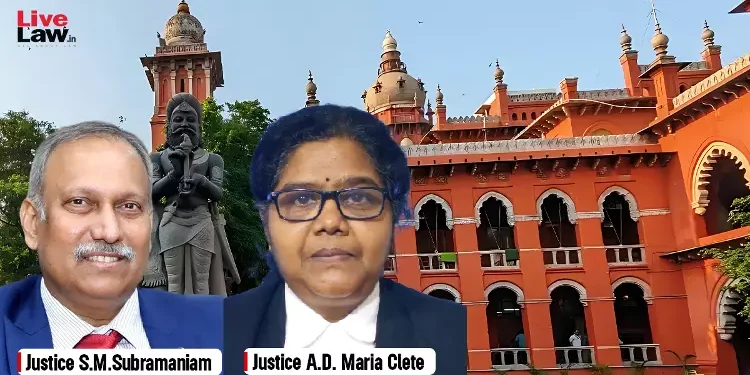Madurai, India – July 2, 2025: The Madurai Bench of the Madras High Court has issued a series of blistering observations in the alleged custodial death of 27-year-old Ajith Kumar, a temple security guard in Sivaganga district, Tamil Nadu. The case, which has sparked widespread outrage and drawn sharp judicial scrutiny, has exposed serious lapses in police conduct and raised questions about accountability within India’s law enforcement system. The court’s remarks, made during hearings on July 1, 2025, underscore the gravity of the incident, described as a “police-organized crime” and a violation of fundamental human rights. Below are five key observations from the court that highlight the severity of the case and its broader implications.
1. Police-Organized Crime and State Responsibility
The court, presided over by Justices S.M. Subramaniam and A.D. Maria Clete, labeled the incident a “police-organized crime,” asserting that the state was effectively “killing its own citizens.” The bench expressed dismay at the brutal treatment of Ajith Kumar, who was detained without a formal First Information Report (FIR) in connection with a theft complaint. The judges emphasized that custodial deaths are not mere negligence but a systemic failure, stating, “A person in custody is helpless. It’s in custody that all this has happened.” This observation points to a grave breach of trust in the police’s duty to protect citizens.
2. Unprecedented Brutality in Custodial Violence
The court was particularly shocked by the extent of injuries on Ajith Kumar’s body, as revealed by a post-mortem report showing 30–44 injury marks, including trauma to the head, ribs, and lower body. “Even an ordinary murderer would not have caused this much injury to a person. No part of the body is left,” the bench remarked, highlighting the barbaric nature of the assault. Video evidence presented by human rights lawyer Henri Tiphagne, showing Ajith being beaten with plastic pipes and iron rods, further disturbed the court, which noted that the brutality “shocked the conscience of the people.”
3. Violation of Fundamental Rights
The Madras High Court declared the incident an “illegal custodial death” and a “violation of fundamental rights,” referencing international conventions and India’s own legal precedents, such as the D.K. Basu guidelines, which mandate strict procedures for arrests and detentions. The court criticized the police for detaining Ajith without proper authorization or an FIR, questioning the legality of the actions taken by a special police team under the Manamadurai Deputy Superintendent of Police (DSP). This observation underscores the need for adherence to constitutional protections and due process.
4. Concerns Over Evidence Tampering and Lack of Accountability
The court raised serious concerns about the potential destruction of evidence, noting that “some evidence has been destroyed” and that the crime scene was not properly preserved. The bench directed the Sivaganga Superintendent of Police (SP) and the investigating officer to hand over all evidence, including CCTV footage and call data records, to the appointed judicial inquiry officer, S. John Sundarlal Suresh, by July 8, 2025. The court also questioned why the investigation was conducted outside the police station, possibly to avoid surveillance, and demanded accountability from senior officials, including the SP who was present during the assault.
5. Call for Stringent Action Against Erring Officials
While acknowledging that the entire police force should not be blamed, the court insisted on “stringent action” against those responsible, including higher officials. The bench questioned the government’s initial response, which appeared to shield errant officers, and warned that any attempts to cover up the incident would prompt further judicial scrutiny. The court’s directive to transfer the case to the Central Bureau of Investigation (CBI), as announced by Tamil Nadu Chief Minister M.K. Stalin, reflects the judiciary’s push for an impartial probe to ensure justice for Ajith Kumar’s family.
Broader Context and Response
The custodial death of Ajith Kumar, who was questioned over a theft complaint involving missing jewelry at the Madapuram Badrakaliamman Temple, has ignited a political firestorm in Tamil Nadu. Opposition parties, including the AIADMK and BJP, have condemned the incident, with the latter alleging 24 custodial deaths under the current government. The court’s intervention, coupled with public outrage and video evidence, prompted swift action: five police officers were arrested, six were suspended, and the Sivaganga SP was placed on “compulsory wait.” The case has been transferred to the CBI for a transparent investigation, with Chief Minister Stalin personally assuring Ajith’s family of justice and support.
Global Implications
The Sivaganga custodial death case highlights a persistent global challenge: custodial violence and the need for robust mechanisms to protect human rights. The Madras High Court’s strong stance serves as a reminder that law enforcement must operate within the bounds of legality and humanity. As the judicial inquiry and CBI probe unfold, the case is likely to influence discussions on police reform and accountability, both in India and internationally, where similar issues continue to spark debate.
The court has adjourned the case to July 8, 2025, awaiting the judicial inquiry report and further updates on actions taken against the involved officials. The world watches as Tamil Nadu grapples with this tragic incident, seeking justice for Ajith Kumar and accountability for those entrusted to uphold the law.
Note: This article is based on verified reports and judicial observations available as of July 2, 2025. The case remains under investigation, and further developments may emerge.





































